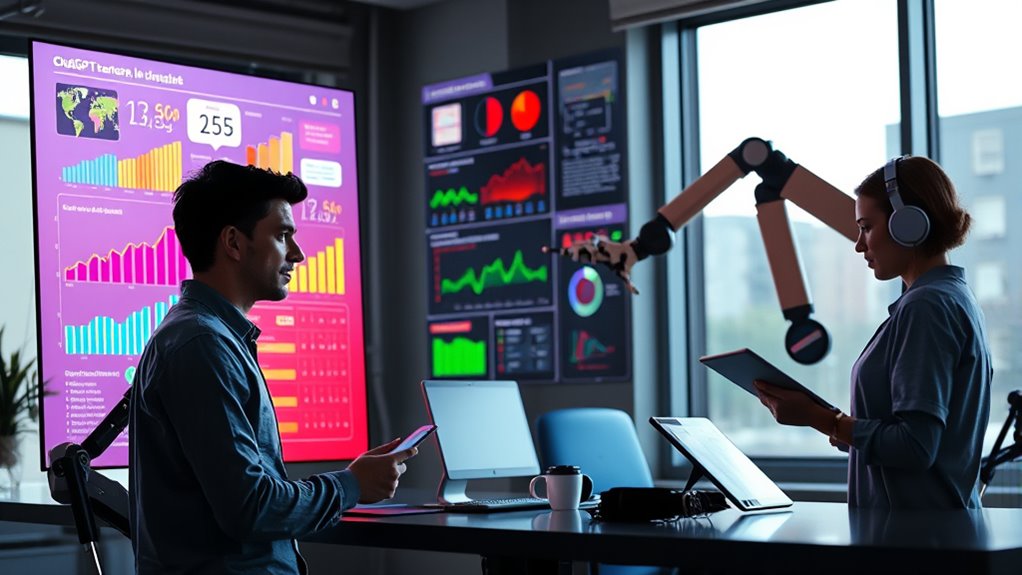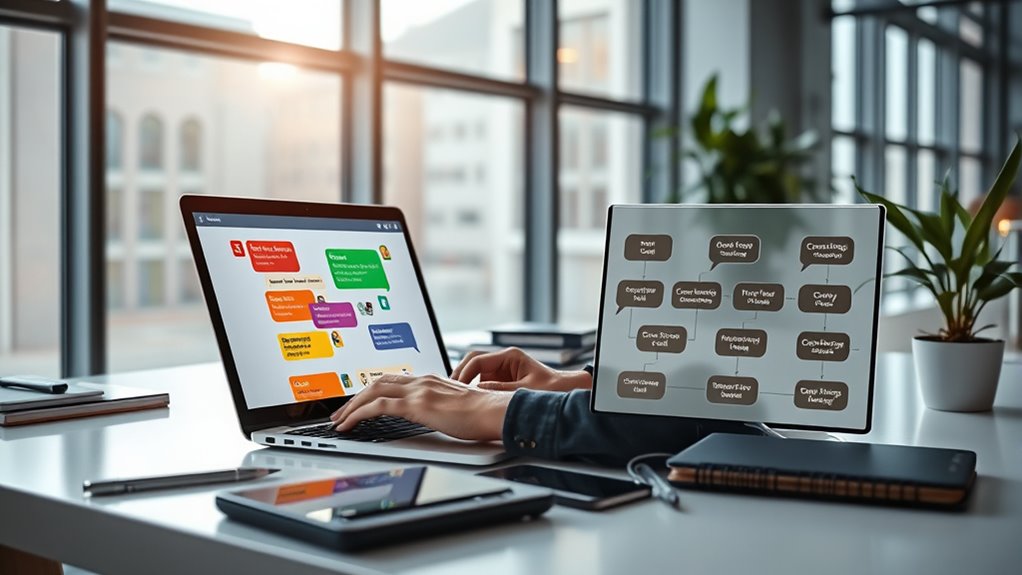ChatGPT is already handling over 100 roles across customer support, research, content creation, HR, and technical tasks. You might use it for personalizing user interactions, analyzing market data, generating content, screening candidates, or coding. If you think about your current workflows, you may find ways you’re already tapping into its potential. Keep exploring, and you’ll discover even more ways this AI can boost your effectiveness and efficiency.
Key Takeaways
- ChatGPT handles customer experience tasks like personalized interactions, multilingual support, and emotional tone analysis.
- It assists in research workflows by generating insights, recognizing data patterns, and validating findings across disciplines.
- Content creation is streamlined through automated SEO analysis, diverse format generation, and bias review.
- HR functions include crafting job descriptions, resume screening, and designing interview simulations to optimize hiring.
- Technical roles benefit from AI-assisted coding, translation, workflow automation, and performance analysis for improved productivity.

ChatGPT is transforming the way businesses and professionals work by taking on a wide range of roles that boost efficiency, creativity, and accuracy. If you’re wondering whether your job or project fits into this evolving landscape, the answer might surprise you. In customer experience management, for example, you could be fine-tuning conversational AI systems to deliver personalized interactions that feel natural and engaging. This involves developing dialogue flows that balance speed with empathy, ensuring customers feel heard and valued. You might also be coordinating multilingual support, helping AI frameworks handle inquiries across different languages and cultures seamlessly. Monitoring emotional intelligence becomes part of your role too, as you analyze AI responses for tone and adjust them to better connect with users’ emotions. Additionally, optimizing service processes by combining NLP expertise with technical troubleshooting can help resolve complex issues faster and more accurately. AI’s role in customer support is expanding rapidly, emphasizing the importance of human-AI collaboration. In research and analysis workflows, your role could involve designing prompts that extract meaningful insights from vast datasets. You’re helping AI recognize patterns in market data or academic papers, turning raw information into actionable knowledge. Validating these insights by cross-referencing AI conclusions with primary sources guarantees accuracy and credibility. As a data synthesizer, you streamline information from various disciplines, making complex topics more accessible. Working as a collaborative knowledge partner, you augment human researchers with AI-driven hypothesis generation, accelerating innovation and discovery. Moreover, color accuracy is essential to ensure that visual data is interpreted correctly, especially when dealing with detailed graphics or images.
Content creation and management also see significant AI involvement. If you’re an AI-assisted content strategist, you optimize SEO and readability using automated analysis tools. Generating diverse formats like blog posts, scripts, and technical documents becomes more efficient through prompt engineering. Personalization engineers tailor marketing messages to different demographics, leveraging AI segmentation to improve engagement. Content quality auditors review AI-generated materials for bias or factual errors, maintaining high standards. Campaign performance analysts use AI to benchmark engagement metrics against KPIs, helping teams refine their strategies.
In HR and recruitment, your role might involve creating standardized job descriptions with ChatGPT, making role requirements clearer and more consistent. Resume screening engineers automate initial evaluations, parsing keywords to identify the best candidates quickly. Designing adaptive interview simulations provides pre-screening tools that assess technical and professional skills. Recruitment analytics specialists track metrics like downtime reduction, with many companies now relying heavily on AI in hiring processes. Automating onboarding workflows by generating training materials from ChatGPT templates further streamlines the hiring pipeline.
If you’re involved in freelance or remote work, you could be crafting tailored prompts for niche client needs, providing translation services with AI context-awareness, or integrating ChatGPT plugins into workflows to automate repetitive tasks. Content optimization consultants analyze performance metrics to improve copy quality, while remote collaboration trainers implement AI-enhanced project management tools to facilitate team coordination.
In technical and development roles, AI-augmented software engineers accelerate backend coding through code generation and debugging. Whether you’re directly involved in these areas or exploring new applications, ChatGPT’s expanding roles show how deeply AI is embedding itself into every facet of work—making some tasks faster, smoother, and more precise. [Understanding AI’s capabilities helps professionals adapt to the evolving job landscape.
Frequently Asked Questions
How Accurate Are Chatgpt’s Responses in Professional Settings?
You’re wondering how accurate ChatGPT’s responses are in professional settings. Currently, it performs quite well but isn’t perfect. In medical contexts, it has around 84-91% accuracy, and in legal and financial areas, accuracy ranges from 76% to 85%. However, watch out for hallucinations and outdated info, especially with older models. While it’s a powerful tool, you still need human oversight to guarantee correctness and reliability.
Can Chatgpt Replace Human Customer Service Representatives Entirely?
They say “you can’t teach an old dog new tricks,” but AI like ChatGPT is evolving fast. While it handles routine inquiries, 100% replacement isn’t realistic. You’ll find it great for efficiency, but complex, emotionally charged issues still need a human touch. So, it’s more about augmentation than replacement—allowing you to focus on high-value, nuanced interactions that AI can’t yet master.
What Industries Are Most Benefiting From Chatgpt Integration?
You’ll find industries like marketing, eCommerce, hospitality, and enterprise operations benefiting the most from ChatGPT integration. In marketing, it boosts productivity and personalization. Retailers use it for customer queries and data analysis, while hotels improve guest services with AI chatbots. Large enterprises save considerably by automating tasks. If you’re in any of these sectors, adopting ChatGPT can streamline processes, cut costs, and enhance customer experiences, giving you a competitive edge.
How Does Chatgpt Handle Sensitive or Confidential Information?
When handling sensitive or confidential info, you should avoid sharing personal, financial, or proprietary data in prompts. ChatGPT retains your prompts in databases, which could be vulnerable to breaches. To stay secure, follow best practices like using encryption, complying with GDPR or CCPA, and limiting sensitive info. Remember, content is screened to prevent harmful responses, but your caution helps guarantee trust and legal compliance in interactions.
What Are the Limitations of Chatgpt’s Current Capabilities?
Imagine a busy highway with traffic rules—you can’t go beyond certain speeds or take every exit. Similarly, your ChatGPT has limitations: message caps vary by plan, complex queries eat more tokens, and feature access depends on your subscription. During peak times, delays and downgrades happen, like traffic jams. These restrictions make certain that smooth operation, but they also mean you might need patience or upgrades for full-speed performance.
Conclusion
So, whether you’re writing, researching, planning, or learning, ChatGPT is already helping you in countless ways. It’s simplifying tasks, sparking creativity, solving problems, and saving time. It’s guiding your ideas, supporting your growth, and enhancing your productivity. Embrace its capabilities, explore new possibilities, and stay curious. Because in this rapidly evolving world, staying ahead means knowing how to harness the power of ChatGPT—your versatile, ever-ready assistant.









